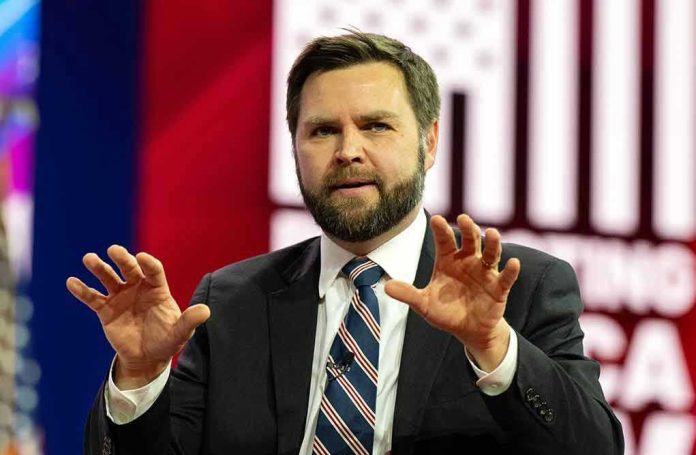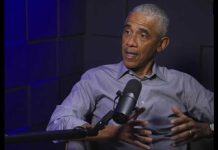
When a sitting Vice President publicly hopes his Hindu wife will embrace Christianity, it’s not just marriage talk—it’s a flashpoint for how faith, love, and politics collide in America’s spotlight.
Story Overview
- JD Vance’s remarks about his wife’s faith at a Turning Point USA event drew fierce backlash for perceived religious insensitivity.
- The controversy highlights the delicate nature of interfaith marriages in public life.
- Hindu and interfaith communities responded with demands for respect and autonomy.
- The incident has fueled a national debate on pluralism, identity, and political leadership.
Public Faith, Private Family: The Vance Comments Ignite a Firestorm
JD Vance, Vice President of the United States and an outspoken Catholic, stood before a crowd at the University of Mississippi and spoke with candor about his home life. He explained that while his wife Usha, raised Hindu, often attends church with him, he “wishes” she would be “moved” by Christianity. Within hours, this personal hope became political dynamite. The audience, mostly conservative students, heard a familiar narrative about faith, but the country heard an elected leader seemingly urging religious conversion for his spouse—a move seen by critics as crossing a line between personal conviction and public overreach.
Social media turned white-hot as clips of Vance’s comments circulated. Hashtags about religious freedom, Hindu identity, and interfaith respect began trending. Major media outlets, advocacy groups, and ordinary Americans weighed in. Some accused Vance of undermining religious pluralism, while others saw his openness as a genuine, if misguided, expression of faith. The backlash from Hindu American organizations was swift and unequivocal—they demanded respect for religious autonomy and called out what they viewed as an attempt to erase or subordinate non-Christian identities within the nation’s highest political circles.
Interfaith Marriage in the Political Arena: A Tense Balancing Act
The Vance family has long walked a tightrope familiar to many interfaith households. Usha Vance, an accomplished attorney of Indian descent, has celebrated both Christian and Hindu traditions with her family. The couple’s decision to raise their children Christian while honoring Usha’s heritage—reflected in a son named Vivek, Sanskrit for “wisdom”—suggests an intentional, if imperfect, effort at pluralism. Yet when a public figure articulates a hope for his spouse’s conversion, the stakes shift. The comment, made at a Turning Point USA tribute to the late Charlie Kirk, reverberated far beyond the event, highlighting the vulnerability of minority faiths in an America still wrestling with its religious diversity.
Observers noted a tension at the heart of the controversy: the right to personal belief versus the responsibility of public rhetoric. Vance later clarified that he respects his wife’s autonomy: “If she doesn’t [convert], then God says everybody has free will, so that doesn’t cause a problem for me.” But the apology stopped short of addressing the deeper wound—many felt his initial comments revealed a blind spot about interfaith respect and the lived realities of millions of Americans whose families span faith traditions.
JD Vance slammed for saying he hopes his Hindu wife Usha will ‘join Christianity’ at Charlie Kirk event https://t.co/JGotgbIzB5 via @@YahooNews His wife should've said 'I've watched how you live your hypocrisy & all your hated so I'm waiting on you to '..join Christianity'.
— GaryInPismo (@GaryInPismo) October 31, 2025
Broader Ripples: Political, Social, and Cultural Consequences
The fallout from Vance’s remarks was not limited to online outrage or op-ed columns. Hindu American groups voiced fears of marginalization and asked whether their identities were truly valued in the nation’s political fabric. Political analysts warned that such controversies risk alienating not just Hindu Americans but the broader coalition of interfaith and moderate voters. For opponents, the incident became fresh ammunition to question Vance’s commitment to pluralism and inclusivity.
Yet the controversy also energized conservative Christian segments who saw Vance’s comments as affirming their values. This divide mirrors the larger American debate: should leaders set an example of religious pluralism, or unapologetically proclaim their faith? The answers, and the fault lines, are far from settled. Meanwhile, Usha Vance herself has reportedly stated she has no intention of converting, reinforcing her own autonomy and the complexity of their family’s identity.
The Lasting Debate: Faith, Identity, and the Role of Public Figures
Media coverage has not let the story fade. Every new statement—whether from advocacy groups, academic commentators, or Vance himself—feeds the ongoing debate about what it means to be an interfaith family in public view. Scholars warn that public comments about religious conversion, especially by leaders, can reinforce stereotypes and deepen divisions. Interfaith marriage experts urge greater sensitivity, arguing that respect and mutual understanding must be the foundation, not conversion.
This episode has become a test case for American pluralism. Will the nation’s leaders model respect for religious difference, or will personal faith continue to blur into political expectation? The answers will shape not just the careers of public figures, but the future of interfaith families and religious minorities across America.



